Organisational Behaviour Report: BBC Company - Task Analysis
VerifiedAdded on 2020/09/17
|15
|4296
|29
Report
AI Summary
This report provides an in-depth analysis of organisational behaviour within the BBC company. It begins by examining the influence of organisational culture, power dynamics, and politics on individual and team behaviour. The report then delves into various motivation theories, such as Maslow's hierarchy, Herzberg's two-factor theory, and Alderfer's ERG theory, and their application in achieving BBC's organisational goals. Furthermore, it contrasts effective and ineffective team structures, highlighting the characteristics that contribute to successful teamwork. The report also explores the philosophies of organisational behaviour relevant to BBC, emphasizing the importance of a positive and healthy working environment. The analysis covers topics such as power structures, role delegation, task management, and employee respect, concluding with the significance of organisational culture in fostering employee performance and overall business success. The report stresses the importance of managers creating a strong and healthy working environment for effective business management, and how they can improve their skills and abilities to perform tasks in an effective manner for best outcomes.
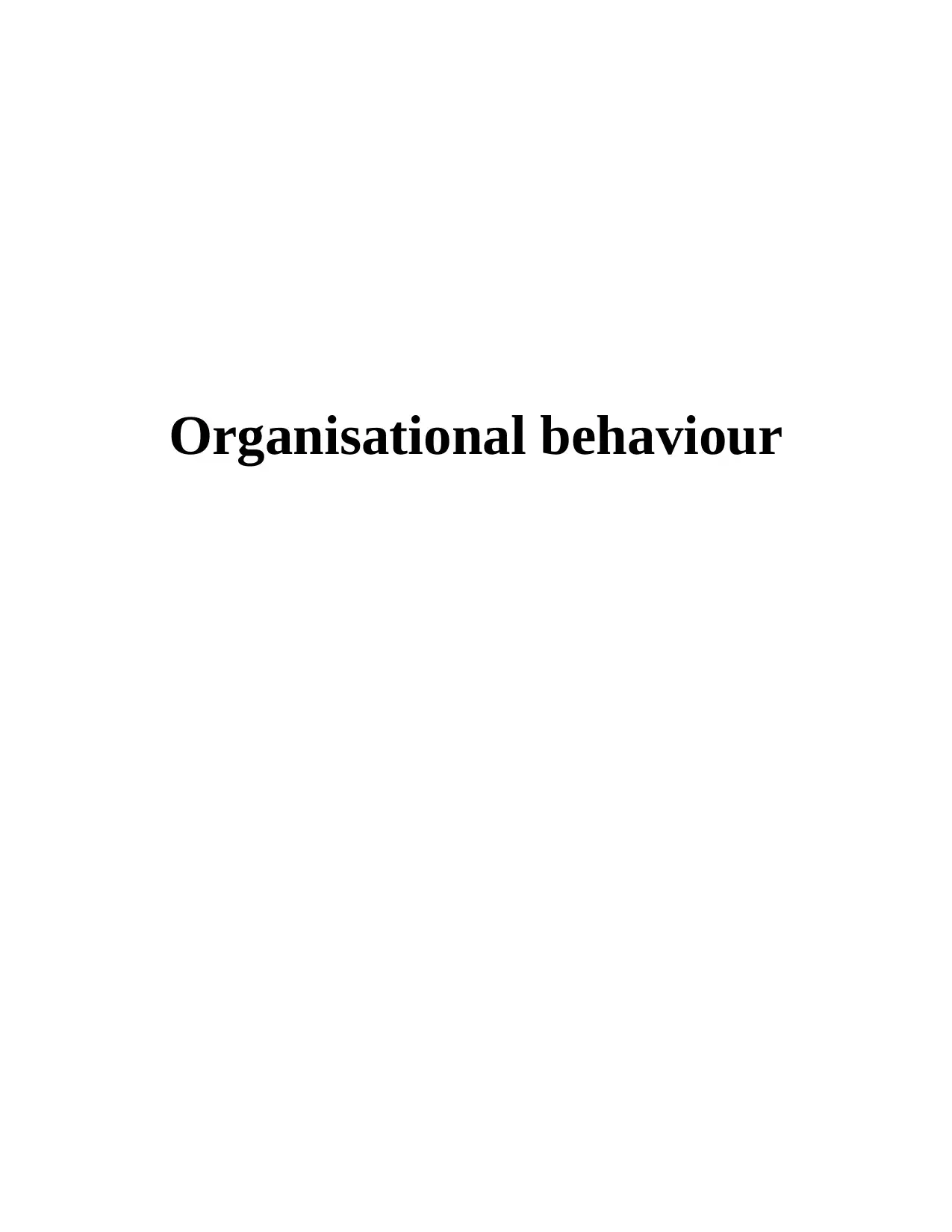
Organisational behaviour
Paraphrase This Document
Need a fresh take? Get an instant paraphrase of this document with our AI Paraphraser
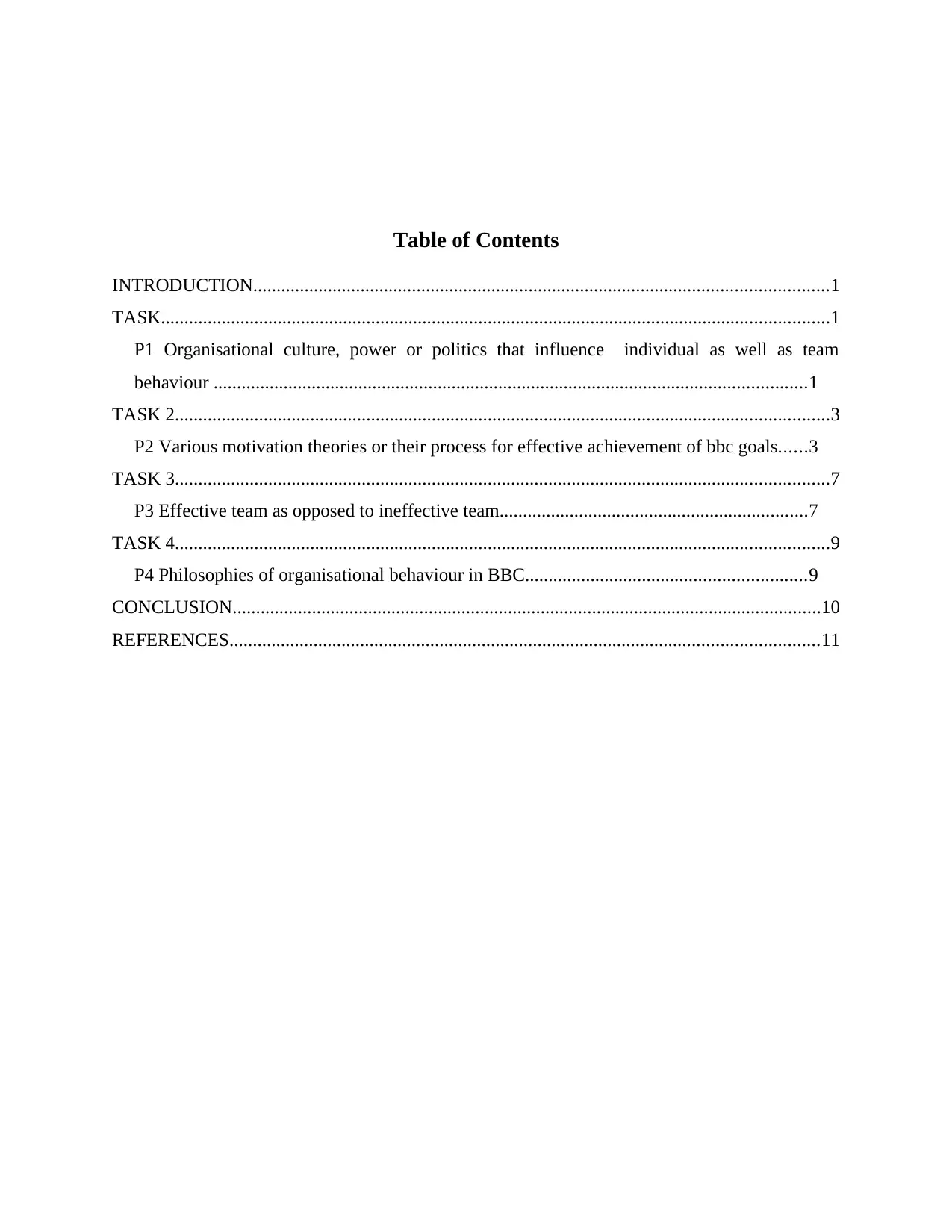
Table of Contents
INTRODUCTION...........................................................................................................................1
TASK...............................................................................................................................................1
P1 Organisational culture, power or politics that influence individual as well as team
behaviour ...............................................................................................................................1
TASK 2............................................................................................................................................3
P2 Various motivation theories or their process for effective achievement of bbc goals......3
TASK 3............................................................................................................................................7
P3 Effective team as opposed to ineffective team..................................................................7
TASK 4............................................................................................................................................9
P4 Philosophies of organisational behaviour in BBC............................................................9
CONCLUSION..............................................................................................................................10
REFERENCES..............................................................................................................................11
INTRODUCTION...........................................................................................................................1
TASK...............................................................................................................................................1
P1 Organisational culture, power or politics that influence individual as well as team
behaviour ...............................................................................................................................1
TASK 2............................................................................................................................................3
P2 Various motivation theories or their process for effective achievement of bbc goals......3
TASK 3............................................................................................................................................7
P3 Effective team as opposed to ineffective team..................................................................7
TASK 4............................................................................................................................................9
P4 Philosophies of organisational behaviour in BBC............................................................9
CONCLUSION..............................................................................................................................10
REFERENCES..............................................................................................................................11

⊘ This is a preview!⊘
Do you want full access?
Subscribe today to unlock all pages.

Trusted by 1+ million students worldwide
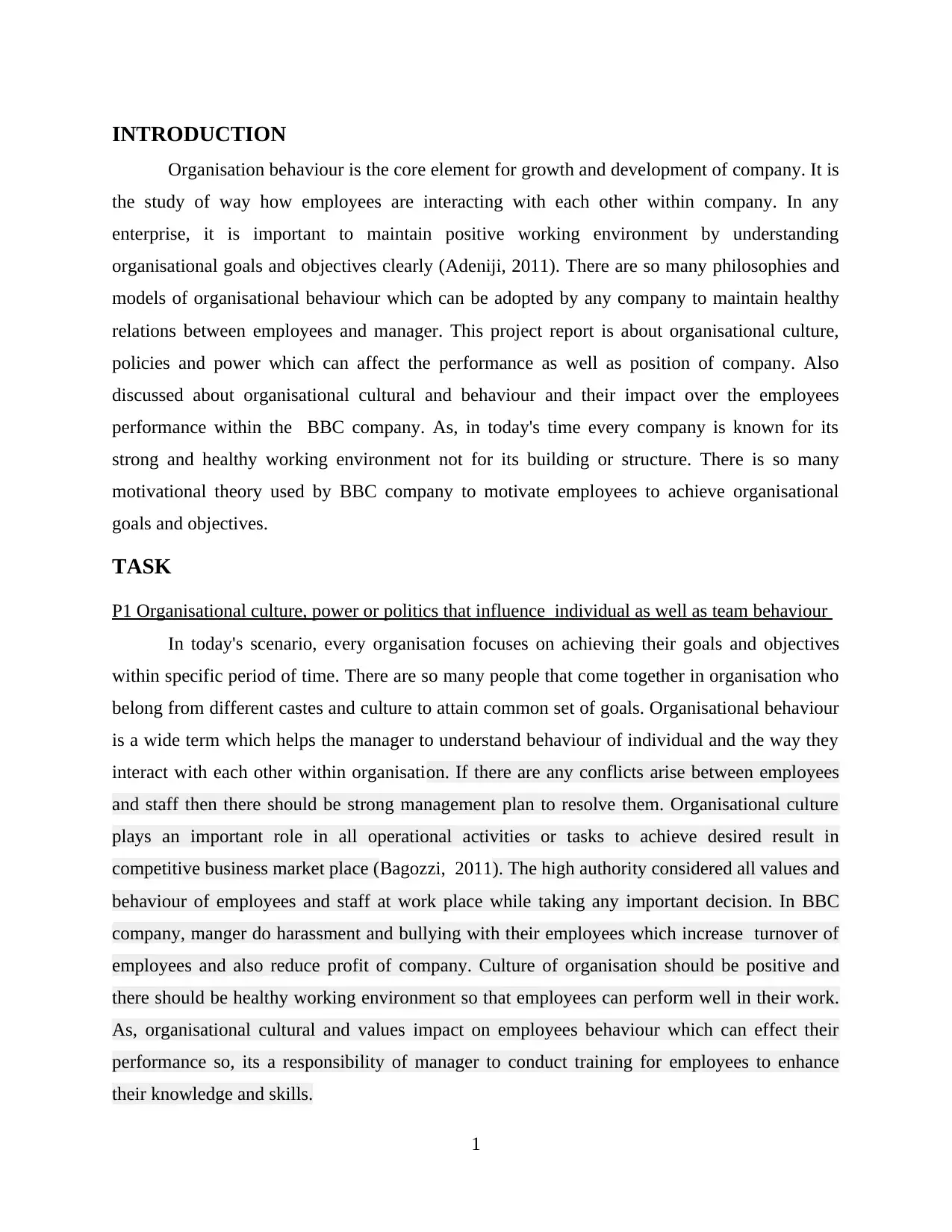
INTRODUCTION
Organisation behaviour is the core element for growth and development of company. It is
the study of way how employees are interacting with each other within company. In any
enterprise, it is important to maintain positive working environment by understanding
organisational goals and objectives clearly (Adeniji, 2011). There are so many philosophies and
models of organisational behaviour which can be adopted by any company to maintain healthy
relations between employees and manager. This project report is about organisational culture,
policies and power which can affect the performance as well as position of company. Also
discussed about organisational cultural and behaviour and their impact over the employees
performance within the BBC company. As, in today's time every company is known for its
strong and healthy working environment not for its building or structure. There is so many
motivational theory used by BBC company to motivate employees to achieve organisational
goals and objectives.
TASK
P1 Organisational culture, power or politics that influence individual as well as team behaviour
In today's scenario, every organisation focuses on achieving their goals and objectives
within specific period of time. There are so many people that come together in organisation who
belong from different castes and culture to attain common set of goals. Organisational behaviour
is a wide term which helps the manager to understand behaviour of individual and the way they
interact with each other within organisation. If there are any conflicts arise between employees
and staff then there should be strong management plan to resolve them. Organisational culture
plays an important role in all operational activities or tasks to achieve desired result in
competitive business market place (Bagozzi, 2011). The high authority considered all values and
behaviour of employees and staff at work place while taking any important decision. In BBC
company, manger do harassment and bullying with their employees which increase turnover of
employees and also reduce profit of company. Culture of organisation should be positive and
there should be healthy working environment so that employees can perform well in their work.
As, organisational cultural and values impact on employees behaviour which can effect their
performance so, its a responsibility of manager to conduct training for employees to enhance
their knowledge and skills.
1
Organisation behaviour is the core element for growth and development of company. It is
the study of way how employees are interacting with each other within company. In any
enterprise, it is important to maintain positive working environment by understanding
organisational goals and objectives clearly (Adeniji, 2011). There are so many philosophies and
models of organisational behaviour which can be adopted by any company to maintain healthy
relations between employees and manager. This project report is about organisational culture,
policies and power which can affect the performance as well as position of company. Also
discussed about organisational cultural and behaviour and their impact over the employees
performance within the BBC company. As, in today's time every company is known for its
strong and healthy working environment not for its building or structure. There is so many
motivational theory used by BBC company to motivate employees to achieve organisational
goals and objectives.
TASK
P1 Organisational culture, power or politics that influence individual as well as team behaviour
In today's scenario, every organisation focuses on achieving their goals and objectives
within specific period of time. There are so many people that come together in organisation who
belong from different castes and culture to attain common set of goals. Organisational behaviour
is a wide term which helps the manager to understand behaviour of individual and the way they
interact with each other within organisation. If there are any conflicts arise between employees
and staff then there should be strong management plan to resolve them. Organisational culture
plays an important role in all operational activities or tasks to achieve desired result in
competitive business market place (Bagozzi, 2011). The high authority considered all values and
behaviour of employees and staff at work place while taking any important decision. In BBC
company, manger do harassment and bullying with their employees which increase turnover of
employees and also reduce profit of company. Culture of organisation should be positive and
there should be healthy working environment so that employees can perform well in their work.
As, organisational cultural and values impact on employees behaviour which can effect their
performance so, its a responsibility of manager to conduct training for employees to enhance
their knowledge and skills.
1
Paraphrase This Document
Need a fresh take? Get an instant paraphrase of this document with our AI Paraphraser
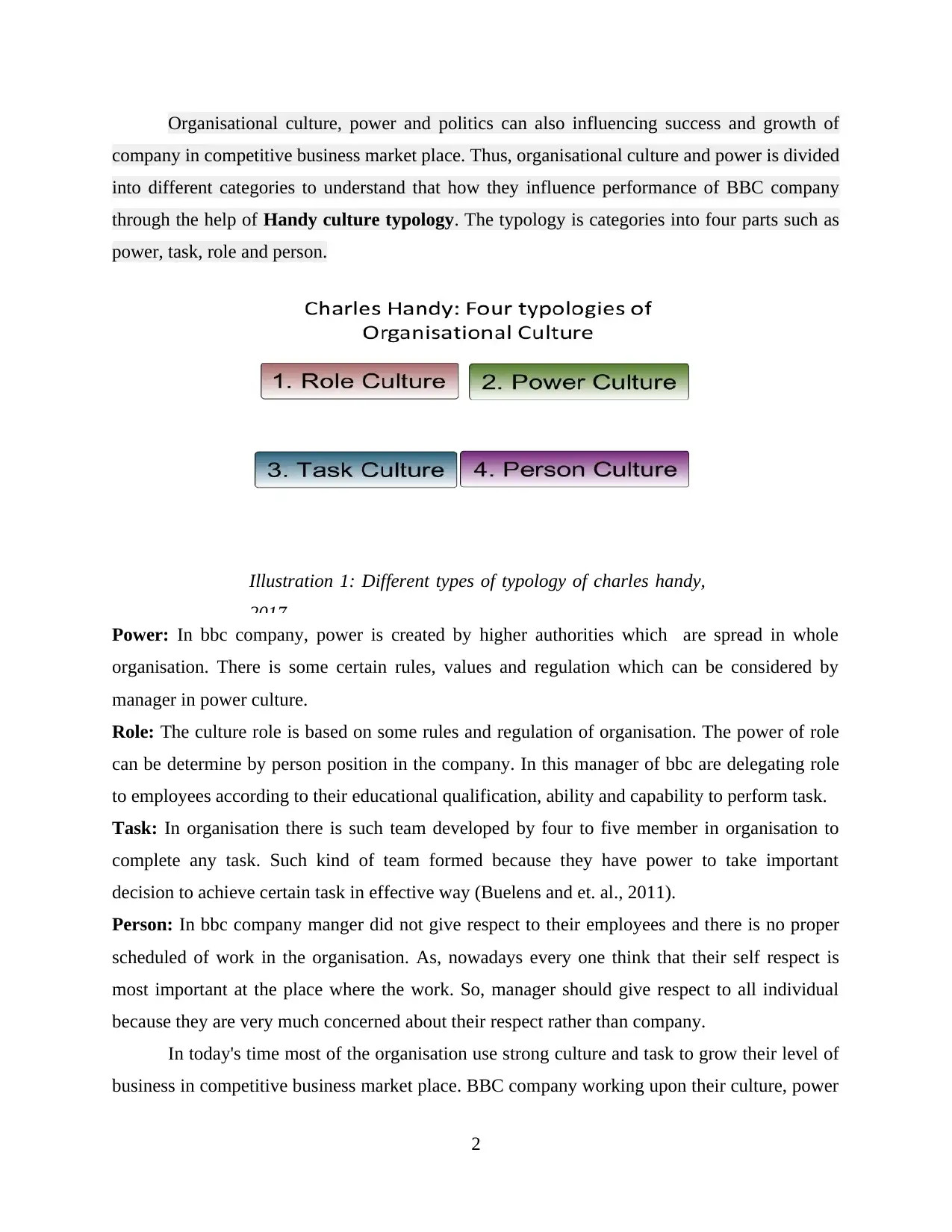
Organisational culture, power and politics can also influencing success and growth of
company in competitive business market place. Thus, organisational culture and power is divided
into different categories to understand that how they influence performance of BBC company
through the help of Handy culture typology. The typology is categories into four parts such as
power, task, role and person.
Power: In bbc company, power is created by higher authorities which are spread in whole
organisation. There is some certain rules, values and regulation which can be considered by
manager in power culture.
Role: The culture role is based on some rules and regulation of organisation. The power of role
can be determine by person position in the company. In this manager of bbc are delegating role
to employees according to their educational qualification, ability and capability to perform task.
Task: In organisation there is such team developed by four to five member in organisation to
complete any task. Such kind of team formed because they have power to take important
decision to achieve certain task in effective way (Buelens and et. al., 2011).
Person: In bbc company manger did not give respect to their employees and there is no proper
scheduled of work in the organisation. As, nowadays every one think that their self respect is
most important at the place where the work. So, manager should give respect to all individual
because they are very much concerned about their respect rather than company.
In today's time most of the organisation use strong culture and task to grow their level of
business in competitive business market place. BBC company working upon their culture, power
2
Illustration 1: Different types of typology of charles handy,
2017
company in competitive business market place. Thus, organisational culture and power is divided
into different categories to understand that how they influence performance of BBC company
through the help of Handy culture typology. The typology is categories into four parts such as
power, task, role and person.
Power: In bbc company, power is created by higher authorities which are spread in whole
organisation. There is some certain rules, values and regulation which can be considered by
manager in power culture.
Role: The culture role is based on some rules and regulation of organisation. The power of role
can be determine by person position in the company. In this manager of bbc are delegating role
to employees according to their educational qualification, ability and capability to perform task.
Task: In organisation there is such team developed by four to five member in organisation to
complete any task. Such kind of team formed because they have power to take important
decision to achieve certain task in effective way (Buelens and et. al., 2011).
Person: In bbc company manger did not give respect to their employees and there is no proper
scheduled of work in the organisation. As, nowadays every one think that their self respect is
most important at the place where the work. So, manager should give respect to all individual
because they are very much concerned about their respect rather than company.
In today's time most of the organisation use strong culture and task to grow their level of
business in competitive business market place. BBC company working upon their culture, power
2
Illustration 1: Different types of typology of charles handy,
2017
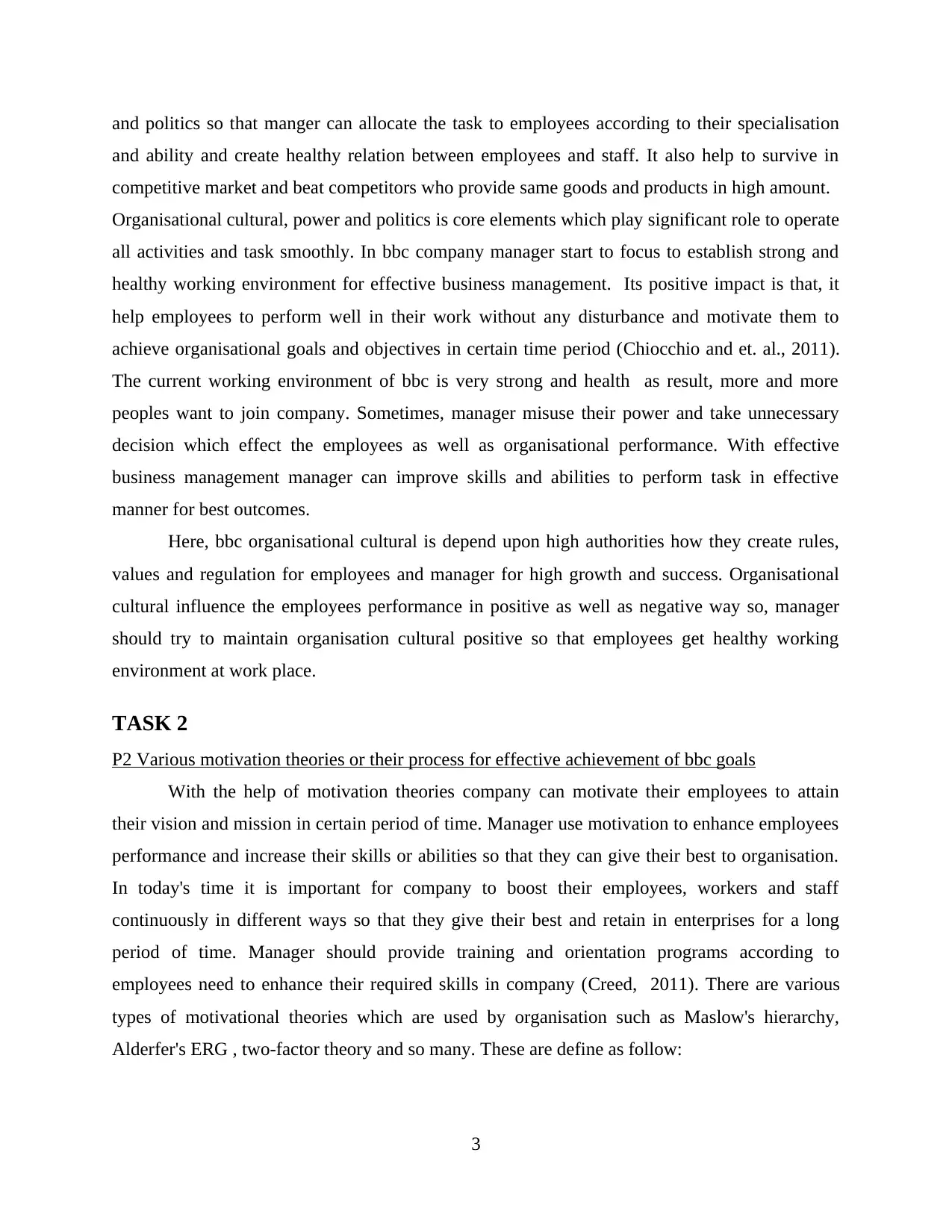
and politics so that manger can allocate the task to employees according to their specialisation
and ability and create healthy relation between employees and staff. It also help to survive in
competitive market and beat competitors who provide same goods and products in high amount.
Organisational cultural, power and politics is core elements which play significant role to operate
all activities and task smoothly. In bbc company manager start to focus to establish strong and
healthy working environment for effective business management. Its positive impact is that, it
help employees to perform well in their work without any disturbance and motivate them to
achieve organisational goals and objectives in certain time period (Chiocchio and et. al., 2011).
The current working environment of bbc is very strong and health as result, more and more
peoples want to join company. Sometimes, manager misuse their power and take unnecessary
decision which effect the employees as well as organisational performance. With effective
business management manager can improve skills and abilities to perform task in effective
manner for best outcomes.
Here, bbc organisational cultural is depend upon high authorities how they create rules,
values and regulation for employees and manager for high growth and success. Organisational
cultural influence the employees performance in positive as well as negative way so, manager
should try to maintain organisation cultural positive so that employees get healthy working
environment at work place.
TASK 2
P2 Various motivation theories or their process for effective achievement of bbc goals
With the help of motivation theories company can motivate their employees to attain
their vision and mission in certain period of time. Manager use motivation to enhance employees
performance and increase their skills or abilities so that they can give their best to organisation.
In today's time it is important for company to boost their employees, workers and staff
continuously in different ways so that they give their best and retain in enterprises for a long
period of time. Manager should provide training and orientation programs according to
employees need to enhance their required skills in company (Creed, 2011). There are various
types of motivational theories which are used by organisation such as Maslow's hierarchy,
Alderfer's ERG , two-factor theory and so many. These are define as follow:
3
and ability and create healthy relation between employees and staff. It also help to survive in
competitive market and beat competitors who provide same goods and products in high amount.
Organisational cultural, power and politics is core elements which play significant role to operate
all activities and task smoothly. In bbc company manager start to focus to establish strong and
healthy working environment for effective business management. Its positive impact is that, it
help employees to perform well in their work without any disturbance and motivate them to
achieve organisational goals and objectives in certain time period (Chiocchio and et. al., 2011).
The current working environment of bbc is very strong and health as result, more and more
peoples want to join company. Sometimes, manager misuse their power and take unnecessary
decision which effect the employees as well as organisational performance. With effective
business management manager can improve skills and abilities to perform task in effective
manner for best outcomes.
Here, bbc organisational cultural is depend upon high authorities how they create rules,
values and regulation for employees and manager for high growth and success. Organisational
cultural influence the employees performance in positive as well as negative way so, manager
should try to maintain organisation cultural positive so that employees get healthy working
environment at work place.
TASK 2
P2 Various motivation theories or their process for effective achievement of bbc goals
With the help of motivation theories company can motivate their employees to attain
their vision and mission in certain period of time. Manager use motivation to enhance employees
performance and increase their skills or abilities so that they can give their best to organisation.
In today's time it is important for company to boost their employees, workers and staff
continuously in different ways so that they give their best and retain in enterprises for a long
period of time. Manager should provide training and orientation programs according to
employees need to enhance their required skills in company (Creed, 2011). There are various
types of motivational theories which are used by organisation such as Maslow's hierarchy,
Alderfer's ERG , two-factor theory and so many. These are define as follow:
3
⊘ This is a preview!⊘
Do you want full access?
Subscribe today to unlock all pages.

Trusted by 1+ million students worldwide
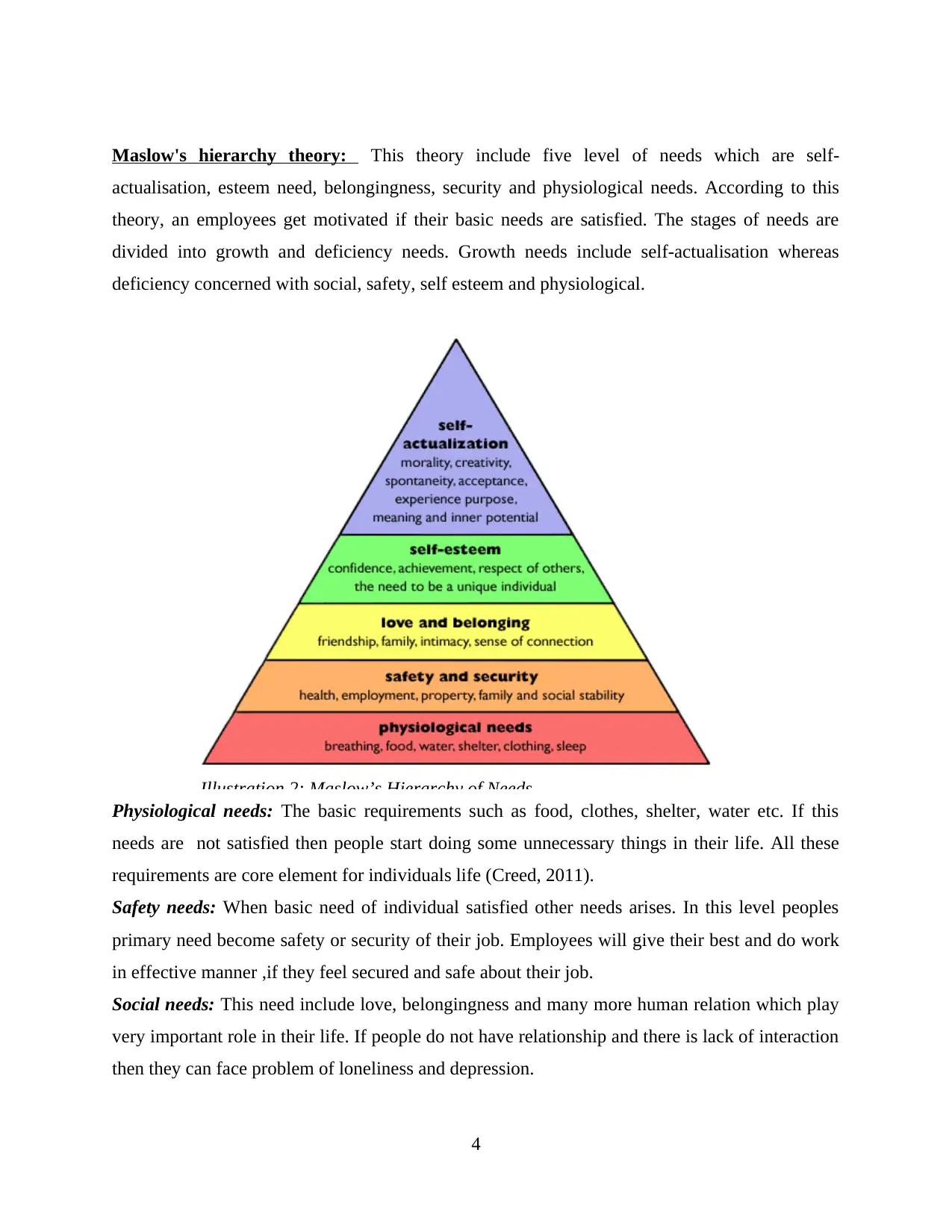
Maslow's hierarchy theory: This theory include five level of needs which are self-
actualisation, esteem need, belongingness, security and physiological needs. According to this
theory, an employees get motivated if their basic needs are satisfied. The stages of needs are
divided into growth and deficiency needs. Growth needs include self-actualisation whereas
deficiency concerned with social, safety, self esteem and physiological.
Physiological needs: The basic requirements such as food, clothes, shelter, water etc. If this
needs are not satisfied then people start doing some unnecessary things in their life. All these
requirements are core element for individuals life (Creed, 2011).
Safety needs: When basic need of individual satisfied other needs arises. In this level peoples
primary need become safety or security of their job. Employees will give their best and do work
in effective manner ,if they feel secured and safe about their job.
Social needs: This need include love, belongingness and many more human relation which play
very important role in their life. If people do not have relationship and there is lack of interaction
then they can face problem of loneliness and depression.
4
Illustration 2: Maslow’s Hierarchy of Needs
actualisation, esteem need, belongingness, security and physiological needs. According to this
theory, an employees get motivated if their basic needs are satisfied. The stages of needs are
divided into growth and deficiency needs. Growth needs include self-actualisation whereas
deficiency concerned with social, safety, self esteem and physiological.
Physiological needs: The basic requirements such as food, clothes, shelter, water etc. If this
needs are not satisfied then people start doing some unnecessary things in their life. All these
requirements are core element for individuals life (Creed, 2011).
Safety needs: When basic need of individual satisfied other needs arises. In this level peoples
primary need become safety or security of their job. Employees will give their best and do work
in effective manner ,if they feel secured and safe about their job.
Social needs: This need include love, belongingness and many more human relation which play
very important role in their life. If people do not have relationship and there is lack of interaction
then they can face problem of loneliness and depression.
4
Illustration 2: Maslow’s Hierarchy of Needs
Paraphrase This Document
Need a fresh take? Get an instant paraphrase of this document with our AI Paraphraser
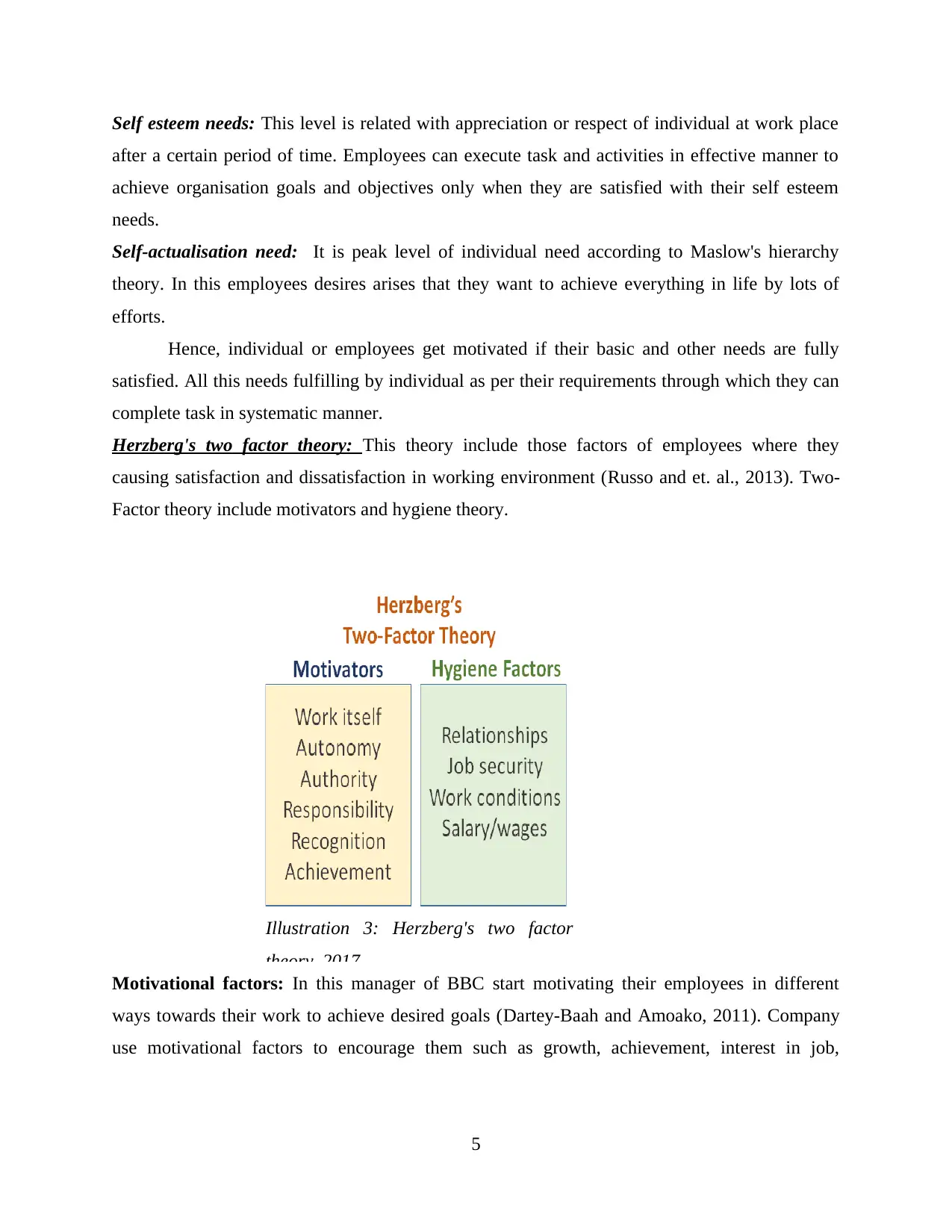
Self esteem needs: This level is related with appreciation or respect of individual at work place
after a certain period of time. Employees can execute task and activities in effective manner to
achieve organisation goals and objectives only when they are satisfied with their self esteem
needs.
Self-actualisation need: It is peak level of individual need according to Maslow's hierarchy
theory. In this employees desires arises that they want to achieve everything in life by lots of
efforts.
Hence, individual or employees get motivated if their basic and other needs are fully
satisfied. All this needs fulfilling by individual as per their requirements through which they can
complete task in systematic manner.
Herzberg's two factor theory: This theory include those factors of employees where they
causing satisfaction and dissatisfaction in working environment (Russo and et. al., 2013). Two-
Factor theory include motivators and hygiene theory.
Motivational factors: In this manager of BBC start motivating their employees in different
ways towards their work to achieve desired goals (Dartey-Baah and Amoako, 2011). Company
use motivational factors to encourage them such as growth, achievement, interest in job,
5
Illustration 3: Herzberg's two factor
theory, 2017
after a certain period of time. Employees can execute task and activities in effective manner to
achieve organisation goals and objectives only when they are satisfied with their self esteem
needs.
Self-actualisation need: It is peak level of individual need according to Maslow's hierarchy
theory. In this employees desires arises that they want to achieve everything in life by lots of
efforts.
Hence, individual or employees get motivated if their basic and other needs are fully
satisfied. All this needs fulfilling by individual as per their requirements through which they can
complete task in systematic manner.
Herzberg's two factor theory: This theory include those factors of employees where they
causing satisfaction and dissatisfaction in working environment (Russo and et. al., 2013). Two-
Factor theory include motivators and hygiene theory.
Motivational factors: In this manager of BBC start motivating their employees in different
ways towards their work to achieve desired goals (Dartey-Baah and Amoako, 2011). Company
use motivational factors to encourage them such as growth, achievement, interest in job,
5
Illustration 3: Herzberg's two factor
theory, 2017
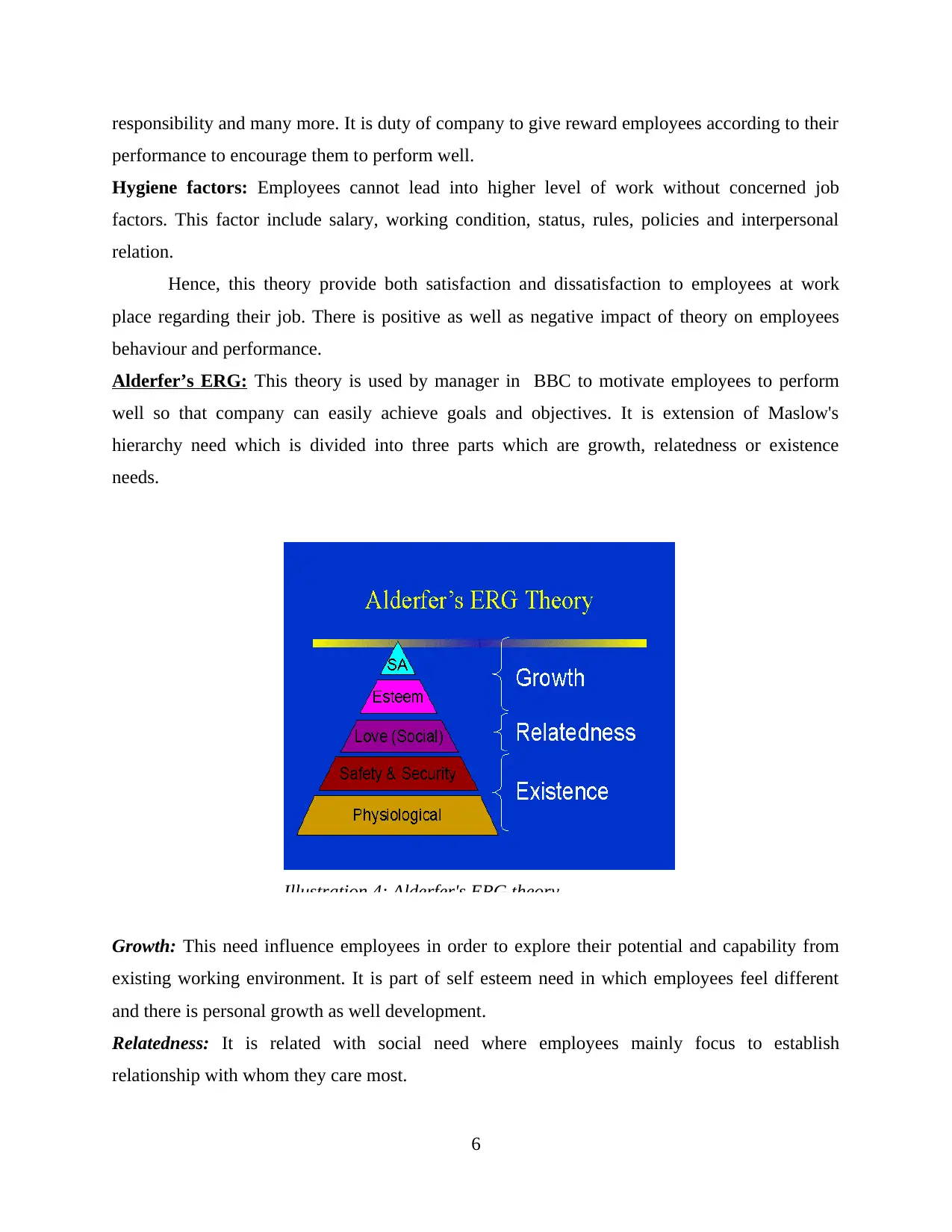
responsibility and many more. It is duty of company to give reward employees according to their
performance to encourage them to perform well.
Hygiene factors: Employees cannot lead into higher level of work without concerned job
factors. This factor include salary, working condition, status, rules, policies and interpersonal
relation.
Hence, this theory provide both satisfaction and dissatisfaction to employees at work
place regarding their job. There is positive as well as negative impact of theory on employees
behaviour and performance.
Alderfer’s ERG: This theory is used by manager in BBC to motivate employees to perform
well so that company can easily achieve goals and objectives. It is extension of Maslow's
hierarchy need which is divided into three parts which are growth, relatedness or existence
needs.
Growth: This need influence employees in order to explore their potential and capability from
existing working environment. It is part of self esteem need in which employees feel different
and there is personal growth as well development.
Relatedness: It is related with social need where employees mainly focus to establish
relationship with whom they care most.
6
Illustration 4: Alderfer's ERG theory
performance to encourage them to perform well.
Hygiene factors: Employees cannot lead into higher level of work without concerned job
factors. This factor include salary, working condition, status, rules, policies and interpersonal
relation.
Hence, this theory provide both satisfaction and dissatisfaction to employees at work
place regarding their job. There is positive as well as negative impact of theory on employees
behaviour and performance.
Alderfer’s ERG: This theory is used by manager in BBC to motivate employees to perform
well so that company can easily achieve goals and objectives. It is extension of Maslow's
hierarchy need which is divided into three parts which are growth, relatedness or existence
needs.
Growth: This need influence employees in order to explore their potential and capability from
existing working environment. It is part of self esteem need in which employees feel different
and there is personal growth as well development.
Relatedness: It is related with social need where employees mainly focus to establish
relationship with whom they care most.
6
Illustration 4: Alderfer's ERG theory
⊘ This is a preview!⊘
Do you want full access?
Subscribe today to unlock all pages.

Trusted by 1+ million students worldwide
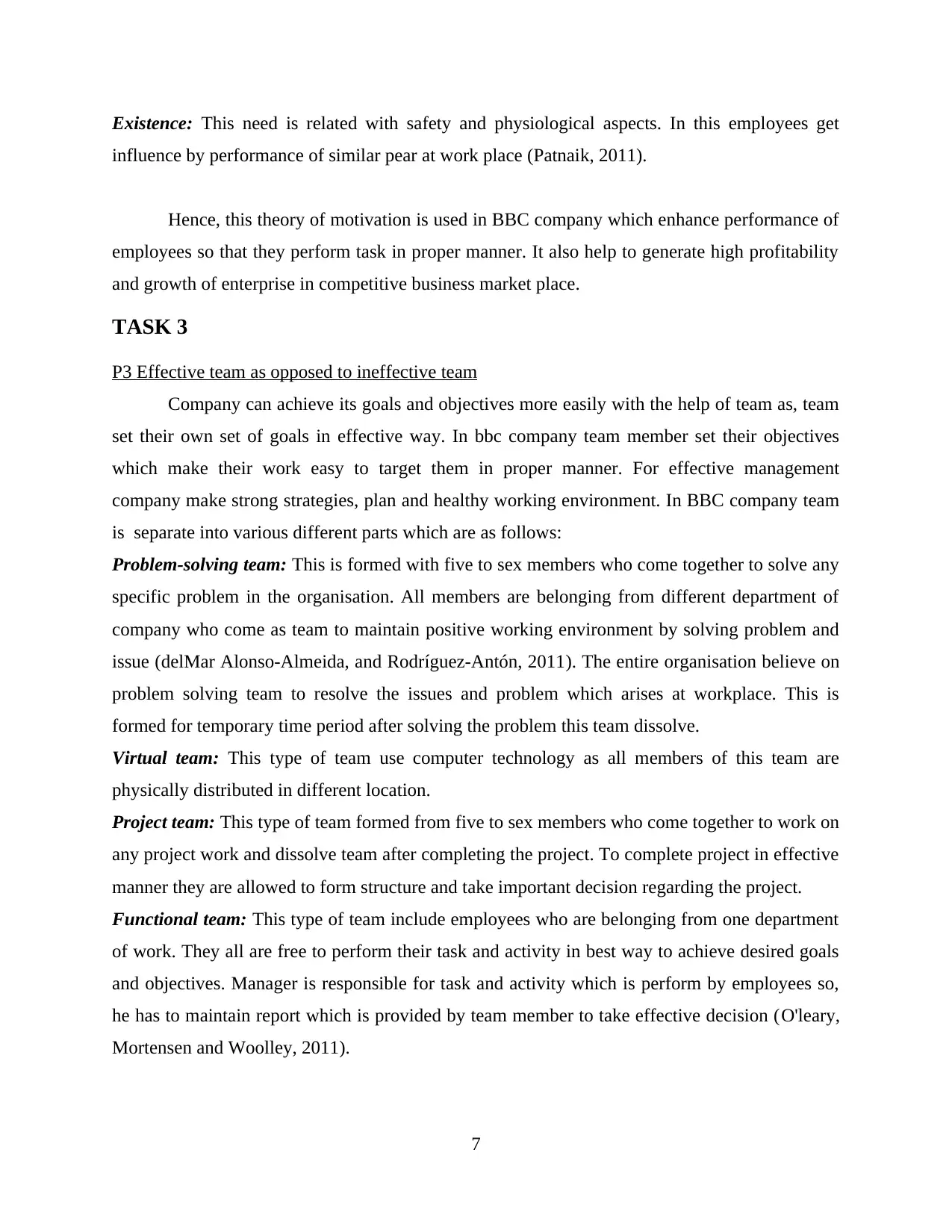
Existence: This need is related with safety and physiological aspects. In this employees get
influence by performance of similar pear at work place (Patnaik, 2011).
Hence, this theory of motivation is used in BBC company which enhance performance of
employees so that they perform task in proper manner. It also help to generate high profitability
and growth of enterprise in competitive business market place.
TASK 3
P3 Effective team as opposed to ineffective team
Company can achieve its goals and objectives more easily with the help of team as, team
set their own set of goals in effective way. In bbc company team member set their objectives
which make their work easy to target them in proper manner. For effective management
company make strong strategies, plan and healthy working environment. In BBC company team
is separate into various different parts which are as follows:
Problem-solving team: This is formed with five to sex members who come together to solve any
specific problem in the organisation. All members are belonging from different department of
company who come as team to maintain positive working environment by solving problem and
issue (delMar Alonso-Almeida, and Rodríguez-Antón, 2011). The entire organisation believe on
problem solving team to resolve the issues and problem which arises at workplace. This is
formed for temporary time period after solving the problem this team dissolve.
Virtual team: This type of team use computer technology as all members of this team are
physically distributed in different location.
Project team: This type of team formed from five to sex members who come together to work on
any project work and dissolve team after completing the project. To complete project in effective
manner they are allowed to form structure and take important decision regarding the project.
Functional team: This type of team include employees who are belonging from one department
of work. They all are free to perform their task and activity in best way to achieve desired goals
and objectives. Manager is responsible for task and activity which is perform by employees so,
he has to maintain report which is provided by team member to take effective decision (O'leary,
Mortensen and Woolley, 2011).
7
influence by performance of similar pear at work place (Patnaik, 2011).
Hence, this theory of motivation is used in BBC company which enhance performance of
employees so that they perform task in proper manner. It also help to generate high profitability
and growth of enterprise in competitive business market place.
TASK 3
P3 Effective team as opposed to ineffective team
Company can achieve its goals and objectives more easily with the help of team as, team
set their own set of goals in effective way. In bbc company team member set their objectives
which make their work easy to target them in proper manner. For effective management
company make strong strategies, plan and healthy working environment. In BBC company team
is separate into various different parts which are as follows:
Problem-solving team: This is formed with five to sex members who come together to solve any
specific problem in the organisation. All members are belonging from different department of
company who come as team to maintain positive working environment by solving problem and
issue (delMar Alonso-Almeida, and Rodríguez-Antón, 2011). The entire organisation believe on
problem solving team to resolve the issues and problem which arises at workplace. This is
formed for temporary time period after solving the problem this team dissolve.
Virtual team: This type of team use computer technology as all members of this team are
physically distributed in different location.
Project team: This type of team formed from five to sex members who come together to work on
any project work and dissolve team after completing the project. To complete project in effective
manner they are allowed to form structure and take important decision regarding the project.
Functional team: This type of team include employees who are belonging from one department
of work. They all are free to perform their task and activity in best way to achieve desired goals
and objectives. Manager is responsible for task and activity which is perform by employees so,
he has to maintain report which is provided by team member to take effective decision (O'leary,
Mortensen and Woolley, 2011).
7
Paraphrase This Document
Need a fresh take? Get an instant paraphrase of this document with our AI Paraphraser
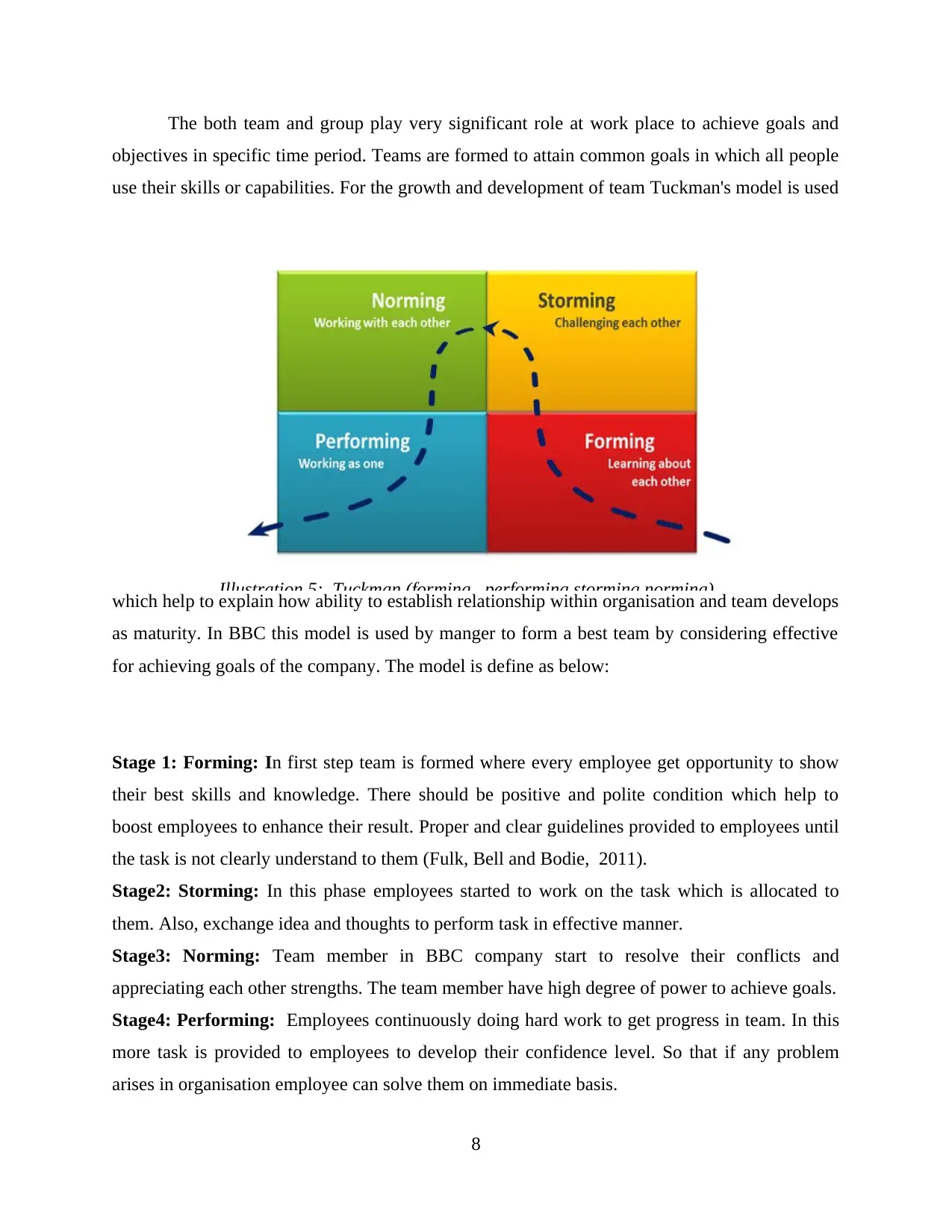
The both team and group play very significant role at work place to achieve goals and
objectives in specific time period. Teams are formed to attain common goals in which all people
use their skills or capabilities. For the growth and development of team Tuckman's model is used
which help to explain how ability to establish relationship within organisation and team develops
as maturity. In BBC this model is used by manger to form a best team by considering effective
for achieving goals of the company. The model is define as below:
Stage 1: Forming: In first step team is formed where every employee get opportunity to show
their best skills and knowledge. There should be positive and polite condition which help to
boost employees to enhance their result. Proper and clear guidelines provided to employees until
the task is not clearly understand to them (Fulk, Bell and Bodie, 2011).
Stage2: Storming: In this phase employees started to work on the task which is allocated to
them. Also, exchange idea and thoughts to perform task in effective manner.
Stage3: Norming: Team member in BBC company start to resolve their conflicts and
appreciating each other strengths. The team member have high degree of power to achieve goals.
Stage4: Performing: Employees continuously doing hard work to get progress in team. In this
more task is provided to employees to develop their confidence level. So that if any problem
arises in organisation employee can solve them on immediate basis.
8
Illustration 5: Tuckman (forming, performing,storming,norming)
objectives in specific time period. Teams are formed to attain common goals in which all people
use their skills or capabilities. For the growth and development of team Tuckman's model is used
which help to explain how ability to establish relationship within organisation and team develops
as maturity. In BBC this model is used by manger to form a best team by considering effective
for achieving goals of the company. The model is define as below:
Stage 1: Forming: In first step team is formed where every employee get opportunity to show
their best skills and knowledge. There should be positive and polite condition which help to
boost employees to enhance their result. Proper and clear guidelines provided to employees until
the task is not clearly understand to them (Fulk, Bell and Bodie, 2011).
Stage2: Storming: In this phase employees started to work on the task which is allocated to
them. Also, exchange idea and thoughts to perform task in effective manner.
Stage3: Norming: Team member in BBC company start to resolve their conflicts and
appreciating each other strengths. The team member have high degree of power to achieve goals.
Stage4: Performing: Employees continuously doing hard work to get progress in team. In this
more task is provided to employees to develop their confidence level. So that if any problem
arises in organisation employee can solve them on immediate basis.
8
Illustration 5: Tuckman (forming, performing,storming,norming)
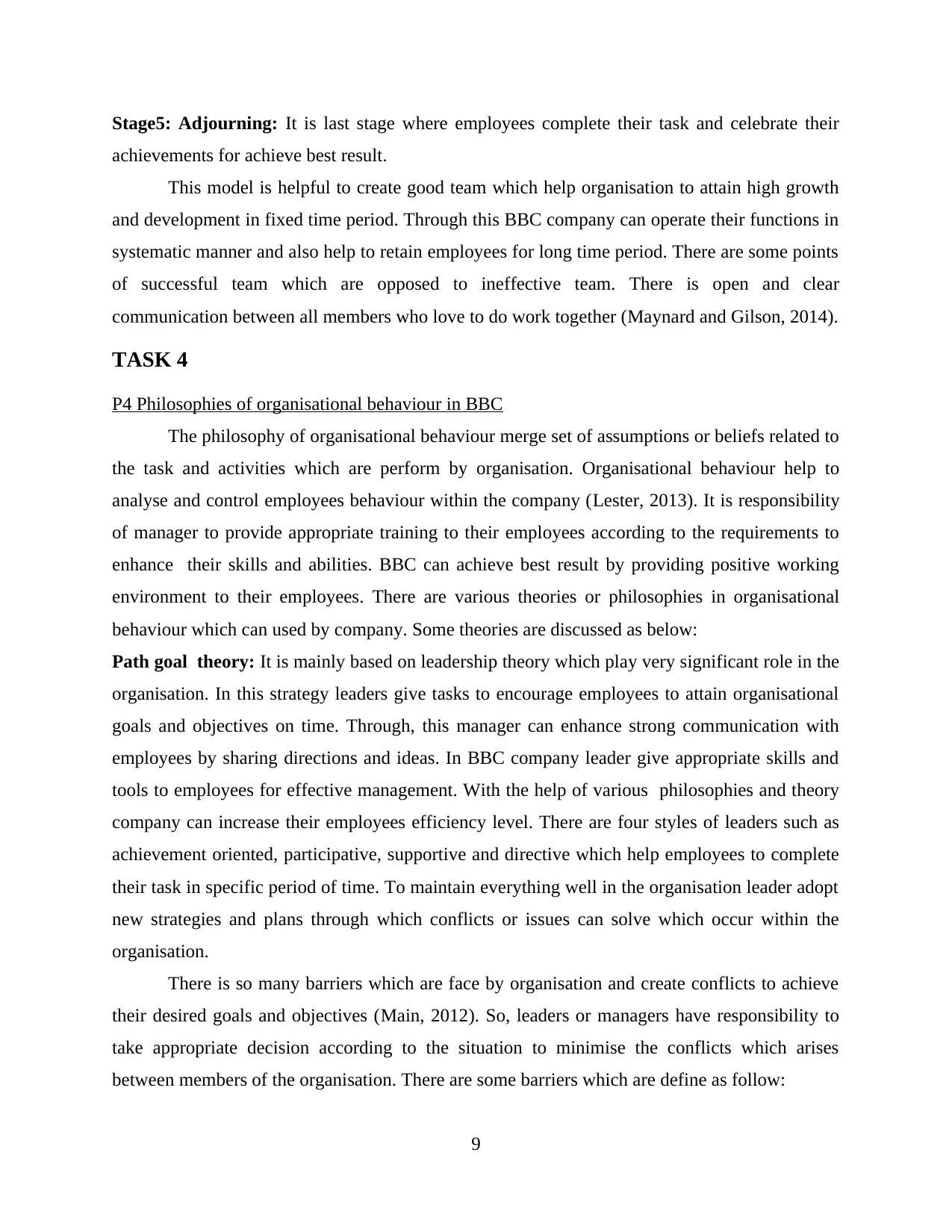
Stage5: Adjourning: It is last stage where employees complete their task and celebrate their
achievements for achieve best result.
This model is helpful to create good team which help organisation to attain high growth
and development in fixed time period. Through this BBC company can operate their functions in
systematic manner and also help to retain employees for long time period. There are some points
of successful team which are opposed to ineffective team. There is open and clear
communication between all members who love to do work together (Maynard and Gilson, 2014).
TASK 4
P4 Philosophies of organisational behaviour in BBC
The philosophy of organisational behaviour merge set of assumptions or beliefs related to
the task and activities which are perform by organisation. Organisational behaviour help to
analyse and control employees behaviour within the company (Lester, 2013). It is responsibility
of manager to provide appropriate training to their employees according to the requirements to
enhance their skills and abilities. BBC can achieve best result by providing positive working
environment to their employees. There are various theories or philosophies in organisational
behaviour which can used by company. Some theories are discussed as below:
Path goal theory: It is mainly based on leadership theory which play very significant role in the
organisation. In this strategy leaders give tasks to encourage employees to attain organisational
goals and objectives on time. Through, this manager can enhance strong communication with
employees by sharing directions and ideas. In BBC company leader give appropriate skills and
tools to employees for effective management. With the help of various philosophies and theory
company can increase their employees efficiency level. There are four styles of leaders such as
achievement oriented, participative, supportive and directive which help employees to complete
their task in specific period of time. To maintain everything well in the organisation leader adopt
new strategies and plans through which conflicts or issues can solve which occur within the
organisation.
There is so many barriers which are face by organisation and create conflicts to achieve
their desired goals and objectives (Main, 2012). So, leaders or managers have responsibility to
take appropriate decision according to the situation to minimise the conflicts which arises
between members of the organisation. There are some barriers which are define as follow:
9
achievements for achieve best result.
This model is helpful to create good team which help organisation to attain high growth
and development in fixed time period. Through this BBC company can operate their functions in
systematic manner and also help to retain employees for long time period. There are some points
of successful team which are opposed to ineffective team. There is open and clear
communication between all members who love to do work together (Maynard and Gilson, 2014).
TASK 4
P4 Philosophies of organisational behaviour in BBC
The philosophy of organisational behaviour merge set of assumptions or beliefs related to
the task and activities which are perform by organisation. Organisational behaviour help to
analyse and control employees behaviour within the company (Lester, 2013). It is responsibility
of manager to provide appropriate training to their employees according to the requirements to
enhance their skills and abilities. BBC can achieve best result by providing positive working
environment to their employees. There are various theories or philosophies in organisational
behaviour which can used by company. Some theories are discussed as below:
Path goal theory: It is mainly based on leadership theory which play very significant role in the
organisation. In this strategy leaders give tasks to encourage employees to attain organisational
goals and objectives on time. Through, this manager can enhance strong communication with
employees by sharing directions and ideas. In BBC company leader give appropriate skills and
tools to employees for effective management. With the help of various philosophies and theory
company can increase their employees efficiency level. There are four styles of leaders such as
achievement oriented, participative, supportive and directive which help employees to complete
their task in specific period of time. To maintain everything well in the organisation leader adopt
new strategies and plans through which conflicts or issues can solve which occur within the
organisation.
There is so many barriers which are face by organisation and create conflicts to achieve
their desired goals and objectives (Main, 2012). So, leaders or managers have responsibility to
take appropriate decision according to the situation to minimise the conflicts which arises
between members of the organisation. There are some barriers which are define as follow:
9
⊘ This is a preview!⊘
Do you want full access?
Subscribe today to unlock all pages.

Trusted by 1+ million students worldwide
1 out of 15
Related Documents
Your All-in-One AI-Powered Toolkit for Academic Success.
+13062052269
info@desklib.com
Available 24*7 on WhatsApp / Email
![[object Object]](/_next/static/media/star-bottom.7253800d.svg)
Unlock your academic potential
Copyright © 2020–2025 A2Z Services. All Rights Reserved. Developed and managed by ZUCOL.





